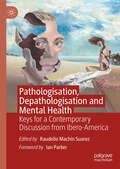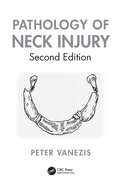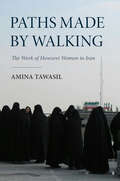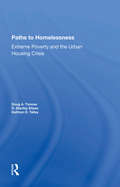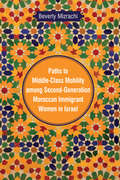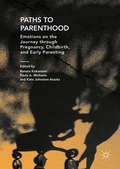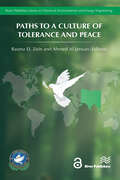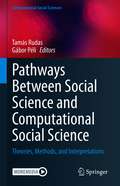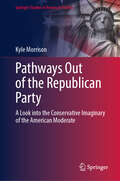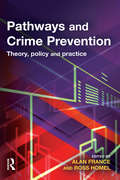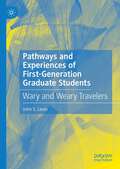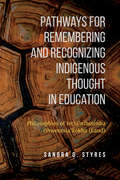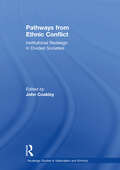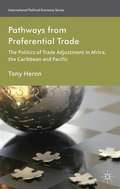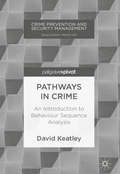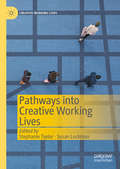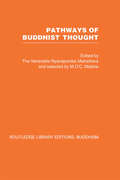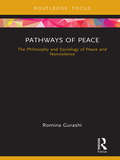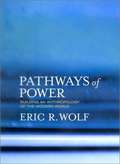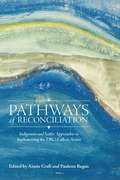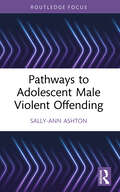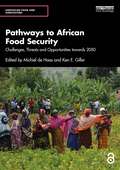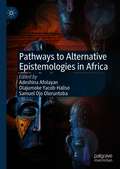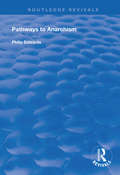- Table View
- List View
Pathologisation, Depathologisation and Mental Health: Keys for a Contemporary Discussion from Ibero-America
by Raudelio Machin SuarezThis book examines the pathologisation and depathologisation of mental health in Ibero-América. It highlights the possibilities and the epistemic limits of the interpretative models of pathos that have legitimised mental health pathologies. Further, it proposes a rereading of psychopathology and analyses the clinical, philosophical, ontological, ethical, psychological and anthropological consequences of this. Across ten chapters it brings together academics from Latin America with colleagues from Europe, Asia and North America to address issues including stigma, aesthetics, childhood, gender, migration, political public or social networks and their relationship with mental health. Section 1 brings critical psychology into dialogue with psychiatry, sociology, philosophy and psychoanalysis to review the conceptual frameworks through which "pathology" has been understood in "psy" discourses. Section 2 presents a range of case studies that demonstrate the impact of debates around the pathologisation and de-pathologisation on mental health care in various populations across Latin American. It will offer fresh insights to practitioners, as well as to students and scholars working in the areas of mental health, critical psychology, medical sociology, Latin American studies, psychiatry and psychoanalysis.
Pathology of Neck Injury
by Peter VanezisPathology of Neck Injury, Second Edition is a practical guide and reference to all pathological aspects of neck injury. It covers a broad spectrum of trauma to the neck region, reflecting the experiences of many distinguished pathologists and those of author, Peter Vanezis, who has more than 50 years of expertise in the field. This highly illustrated text begins by explaining the anatomy of the neck region as it relates to trauma investigation and the various techniques required for its examination. Coverage goes on to describe penetrating injuries, comprising mainly sharp force trauma and firearm injuries. Asphyxial and related deaths are subsequently discussed in a series of chapters, before the focus turns to the examination of blunt impact, non‑compressive injuries. Here special reference is made to their common occurrence in road traffic accidents. Finally, this book concludes with environmental, toxic, and iatrogenic causes of injury. Where appropriate, and especially with regard to penetrating and compressive modes of trauma, the interpretation of injuries and their differentiation into various categories such as homicide, suicide, or accident has been addressed. Pathology of Neck Injury, Second Edition is an essential guide for all those involved in the relevant specialties of pathology, surgery, and forensic medicine – particularly pathologists, both qualified and in training, but also to clinical forensic practitioners, trauma specialists, ENT surgeons, and general surgeons.
Paths Made by Walking: The Work of Howzevi Women in Iran
by Amina TawasilWhat can women's scholastic pursuits tell us about what building an Islamic state looks like for women who are loyal to its project? And what can an ethnographic study of women who are using Islamic education to transform their conditions in Iran teach us about our own humanity?Paths Made by Walking provides insight into these questions by examining how Iranian women have participated in Islamic education since the 1979 revolution. This groundbreaking ethnography on Iranian howzevi (seminarian) women reveals how ideologies of womanhood, institutions, and Islamic practices have played a pivotal role in religiously conservative women's mobility in the Middle East. Applying over a year of ethnographic fieldwork, Amina Tawasil analyzes how the Islamic education of seminarian women has propelled some of them into powerful positions in Iran, from close ties with the state's supreme leader and chief justice to membership in the Basij (voluntary military organization). At the same time, these women often choose to remain "hidden" or to otherwise follow practices that seem inscrutable or illogical from a framework of politicized resistance. By centering the howzevi women's senses of self and revealing their complex interpretations of their beliefs, Tawasil offers a fresh perspective on forms of feminine identity that do not always mirror supposedly universal desires for recognition, autonomy, leadership, or authority.Taking readers into the classrooms, living rooms, and compounds where howzevi women participate in intellectual discourse, Paths Made by Walking invites readers to reconsider their conceptualizations of the women who support the Islamic Republic of Iran.
Paths To Homelessness: Extreme Poverty And The Urban Housing Crisis
by D. Stanley Eitzen Doug A Timmer Kathryn D. Talley D Stanley EitzenThe major theme in this book is that people are homeless because of structural arrangements and trends that result in extreme impoverishment and a shortage of affordable housing in U.S. cities. It explains the economic and historical causes of homelessness with accounts of individuals and families.
Paths to Middle-Class Mobility among Second-Generation Moroccan Immigrant Women in Israel
by Beverly MizrachiWhile first-generation immigrant women often begin their lives at the bottom of their new societies, the fates of their adult daughters can be very different. Still, little research has been done to examine the opportunities or constraints that second-generation women face and the class achievements they make. In this volume, author Beverly Mizrachi presents an in-depth study of 40¬-50-year-old Moroccan women whose parents made up part of the largest ethnic group to enter Israel after its establishment in 1948 and whose mothers began their new lives at the bottom of the economic and social ladder. Through her analysis of the life history narratives of these women, Mizrachi reveals that they used a range and number of sites to achieve an impressive mobility into the low, middle, and high segments of the middle class. Mizrachi's findings have implications for studying the middle-class mobility of second-generation immigrant women from subordinate groups in other Western societies. This book begins by examining the historical background and culture of Jewish communities in Morocco that affected the mobility resources of the first, immigrant generation of Moroccan women in Israel and those accrued by the second generation. Mizrachi goes on to analyze the life history narratives of a group of six second-generation Moroccan women to show how they used their education, employment, gendered spousal relationships, motherhood, residential mobility, and the body to achieve their middle-class mobility. Ultimately, she finds that these women used their human agency and social structures over these multiple social sites to reach their class goals for themselves and their children while simultaneously constructing new classed and ethnicized feminine identities. Mizrachi's findings integrate issues of gender, ethnicity, immigration, and class mobility in a single intriguing study.
Paths to Parenthood: Emotions on the Journey through Pregnancy, Childbirth, and Early Parenting
by Renata Kokanović Paula A. Michaels Kate Johnston-AtaataThis interdisciplinary book explores the affective dimensions of becoming a parent, traversing the life-cycle journey of pregnancy, childbirth, and early parenting. Bringing together researchers from sociology, history, feminist studies, cultural studies, general medicine, and psychiatry, Paths to Parenthood analyses rich narratives that represent a diverse cross-section of parents, including migrants, same-sex couples, and single parents.
Paths to a Culture of Tolerance and Peace
by Basma El Zein Ahmed Al JarwanWe are living today in a multicultural world, surrounded by people from different backgrounds, cultures and religions. Establishing tolerance and peace has become crucial. Without these qualities, social stability and communal harmony are threatened; and acceptance of each other remains elusive.Spreading a culture of tolerance and peace is necessary to address contemporary issues of world peace, this includes reflection on the importance of refusing violence and adopting a more peaceful means for resolving disagreements and conflicts. This book, written by the world’s foremost thinkers in this area, aims to increase feelings of openness and respect toward others, solidarity and sharing based on a sense of security in one's own identity and a capacity to recognize the many dimensions of being human in different cultural and social contexts. Topics discussed in the book include: Promoting Tolerance and Peace Teaching Tolerance and Peace Human Values Intercultural / Interreligious dialogue Human Fraternity document
Pathways Between Social Science and Computational Social Science: Theories, Methods, and Interpretations (Computational Social Sciences)
by Tamás Rudas Gábor PéliThis volume shows that the emergence of computational social science (CSS) is an endogenous response to problems from within the social sciences and not exogeneous. The three parts of the volume address various pathways along which CSS has been developing from and interacting with existing research frameworks. The first part exemplifies how new theoretical models and approaches on which CSS research is based arise from theories of social science. The second part is about methodological advances facilitated by CSS-related techniques. The third part illustrates the contribution of CSS to traditional social science topics, further attesting to the embedded nature of CSS. The expected readership of the volume includes researchers with a traditional social science background who wish to approach CSS, experts in CSS looking for substantive links to more traditional social science theories, methods and topics, and finally, students working in both fields.
Pathways Out of the Republican Party: A Look into the Conservative Imaginary of the American Moderate (Springer Studies in American Politics)
by Kyle MorrisonThis volume reflects nearly two years of Zoom interviews conducted leading up to and following the 2020 US election. In contrast to the abundance of literature on Trump and the far-right/left, the stories within highlight the struggle of the anti-Trump conservative voters who consider themselves caught between two increasingly polarized parties. Left behind by their party, and unwilling or unable to join the opposition, these individuals find themselves abandoned by the system dictated by a series of choiceless decisions. Grounded in anthropological and political theory and field methods, the interviews housed within this book reflect the advantages of the qualitative and holistic approach ethnography brings to the understanding of political identity. The book begins with a brief but comprehensive overview on the history of the Republican Party from Eisenhower to Trump. The following chapter then unpacks the complex and subjective label of ‘American conservatism’. Chapter Three ends with a breakdown of the dominant principles within conservative thought identified in the literature cited and each interview. The next few chapters analyze the party exits through a combination of Albert Hirschman’s (1970) Exit, Voice, Loyalty model and social identity theory. The final chapter of this book presents the reader with an opportunity to consider their positionality as it impacts the future of American democracy. Providing an interdisciplinary analysis of political identity in the American electorate, this volume will be of interest to researchers and students of US politics, electoral politics, identity politics, political parties, public anthropology, and social science in general.
Pathways and Crime Prevention
by Alan France Ross HomelThis book is concerned with the development of prevention policies and approaches that involve intervention 'early' in the lives of children, young people and their families, and explores new evidence that has been emerging from longitudinal and developmental prevention research. It addresses a number of key challenges, arguing that by broadening the research questions and exploring contributions from a wider range of disciplines our understanding of both the pathways into and out of crime and the type of interventions that might work will be greatly enhanced.
Pathways and Experiences of First-Generation Graduate Students: Wary and Weary Travelers
by John S. LevinThis book focuses on first-generation graduate students in the US and the graduate or post-baccalaureate programs that house and educate these students. The several voices in this book, including first-generation graduate students, address the phenomena of graduate students’ experiences and related university practices, with the practices connected to traditional academic and Western values and to academic and neoliberal institutional logics. First-generation graduate students’ narratives, or testimonies, serve as the foundation of the analysis of students’ pathways to graduate school and their experiences within graduate school. The conditions for first-generation graduate students in their programs require remedies that will facilitate student well-being, peer community attachment, and persistence, and will educate and train students for achievement in graduate school and for employment after graduate school.
Pathways for Remembering and Recognizing Indigenous Thought in Education: Philosophies of Iethi'nihstenha Ohwentsia'kekha (Land)
by Sandra StyresIndigenous scholars have been gathering, speaking, and writing about Indigenous knowledge for decades. These knowledges are grounded in ancient traditions and very old pedagogies that have been woven with the tangled strings and chipped beads of colonial relations. Pathways for Remembering and Recognizing Indigenous Thought in Education is an exploration into some of the shared cross-cultural themes that inform and shape Indigenous thought and Indigenous educational philosophy. These philosophies generate tensions, challenges, and contradictions that can become very tangled and messy when considered within the context of current educational systems that reinforce colonial power relations. Sandra D. Styres shows how Indigenous thought can inform decolonizing approaches in education as well as the possibilities for truly transformative teaching practices. This book offers new pathways for remembering, conceptualizing and understanding these ancient knowledges and philosophies within a twenty-first century educational context.
Pathways from Ethnic Conflict: Institutional Redesign in Divided Societies (Routledge Studies in Nationalism and Ethnicity)
by John CoakleyThe book begins with an agenda-setting introduction which will provide an overview of the central question being addressed, such as the circumstances associated with the move towards a political settlement, the parameters of this settlement and the factors that have assisted in bringing it about. The remaining contributions will focus on a range of cases selected for their diversity and their capacity to highlight the full gamut of political approaches to conflict resolution. The cases vary in: the intensity of the conflict (from Belgium, where it is potential rather than actual, to Sri Lanka, where it has come to a recent violent conclusion); in the geopolitical relationship between the competing groups (from Cyprus, where they are sharply segregated geographically, to Northern Ireland, where they are intermingled); in the extent to which a stable constitutional accommodation has been reached (ranging from the Basque Country, with a large range of unresolved problems, to South Africa, which has achieved a significant level of institutional stability). This book ranges over the world’s major geopolitical zones, including Asia, the Middle East, Africa and Europe and will be of interest to practitioners in the field of international security.This book was published as a special issue of Nationalism and Ethnic Politics.
Pathways from Preferential Trade
by Tony HeronTony Heron examines recent global policy responses to the erosion of non-reciprocal tariff and quota preferences caused trade liberalizing by focusing on a sample of small, middle income countries which have historically enjoyed favourable access to OECD markets.
Pathways in Crime: An Introduction To Behaviour Sequence Analysis (Crime Prevention and Security Management)
by David KeatleyThis book introduces a novel approach to analysing and mapping criminal behaviours. Every crime occurs as a chain of behaviours and events, from inception and preparation through to commission and exit from the crime scene. These pathways in crime are complex, dynamic sequences that are by their very nature difficult to analyse. Keatley provides a clear and coherent introduction to Behaviour Sequence Analysis, and the chapters address a wide range of criminal offences, from deception in interrogations through to sexual assaults, serial homicide, and terrorism. Interesting additional similarities between Behaviour Sequence Analysis and other well-known methods, such as crime linkage, crime script analysis, and T-Pattern Analysis are also outlined in detail. Academic researchers in Forensic Psychology and Criminology, as well as applied practitioners and investigators will find this an invaluable book, and will gain clear insight and understanding into the method in order to apply it to their own cases.
Pathways into Creative Working Lives (Creative Working Lives)
by Stephanie Taylor Susan LuckmanThis book presents research on pathways into creative work. The promise of ‘doing what you love’ continues to attract new entrants to the cultural and creative industries. Is that promise betrayed by the realities of pathways into creative work, or does a creative identification offer new personal and professional possibilities in the precarious contexts of contemporary work and employment? Two decades into the 21st century, aspiring creative workers undertake training and higher education courses in increasing numbers. Some attempt to convert personal enthusiasms and amateur activities into income-earning careers. To manage the uncertainties of self-employment, workers may utilise skills developed in other occupations, even developing timely new forms of collective organisation. The collection explores the experience of creative career entrants in numerous national contexts, including Australia, Belgium, China, Ireland, Italy, Finland, the Netherlands, Russia, the US and the UK. Chapters investigate the transitions of new workers and the obstacles they encounter on creative pathways.Chapters 1, 12 and 15 are available open access under a Creative Commons Attribution 4.0 International License via link.springer.com.
Pathways of Buddhist Thought: Essays from The Wheel (Routledge Library Editions: Buddhism)
by Ven NyanaponikaOriginally published in 1971. The essays in this volume cover some of the most important aspects of Buddhism and include discussion of such themes as the nature of Buddhism, Buddhist ethics and philosophical concepts, Buddhism and science, the Power of Mindfulness, Anatta and Nibbana.
Pathways of Desire: The Sexual Migration of Mexican Gay Men
by Héctor CarrilloWith Pathways of Desire, Héctor Carrillo brings us into the lives of Mexican gay men who have left their home country to pursue greater sexual autonomy and sexual freedom in the United States. The groundbreaking ethnographic study brings our attention to the full arc of these men’s migration experiences, from their upbringing in Mexican cities and towns, to their cross-border journeys, to their incorporation into urban gay communities in American cities, and their sexual and romantic relationships with American men. These men’s diverse and fascinating stories demonstrate the intertwining of sexual, economic, and familial motivations for migration. Further, Carrillo shows that sexual globalization must be regarded as a bidirectional, albeit uneven, process of exchange between countries in the global north and the global south. With this approach, Carrillo challenges the view that gay men from countries like Mexico would logically want to migrate to a “more sexually enlightened” country like the United States—a partial and limited understanding, given the dynamic character of sexuality in countries such as Mexico, which are becoming more accepting of sexual diversity. Pathways of Desire also provides a helpful analytical framework for the simultaneous consideration of structural and cultural factors in social scientific studies of sexuality. Carrillo explains the patterns of cross-cultural interaction that sexual migration generates and—at the most practical level—shows how the intricacies of cross-cultural sexual and romantic relations may affect the sexual health and HIV risk of transnational immigrant populations.
Pathways of Peace: The Philosophy and Sociology of Peace and Nonviolence
by Romina GurashiThis book explores the close interconnection that exists between sociological and philosophical scholarship in relation to peace studies. Through an examination of the thought of nine leading philosophers and sociologists in their historical and geographical context, the author considers notions of nonviolent resistance, pacifism and reverse strike, as well as violence theories of conflict, theories of conflict resolution, the problem of war, and political transitions towards democratization. Engaging with the work of Thoreau, Gandhi, Ghaffar Khan, Capitini, Dolci, Bobbio, Galtung, Sharp and Weil, and considering the institutionalisation of peace research, this volume will appeal to scholars and students of sociology, politics and philosophy with interest in peace and security studies, and conflict.
Pathways of Power: Building an Anthropology of the Modern World
by Eric R. WolfPosthumous collection of one of the world's leading anthropologists, spanning well over half a century of scholarship and including both well-known pieces, lesser-known not-easily-accessible pieces, and a few entirely unpublished pieces.
Pathways of Reconciliation: Indigenous and Settler Approaches to Implementing the TRC's Calls to Action (Perceptions on Truth and Reconciliation #2)
by Aimée Craft Paulette ReganSince the Truth and Reconciliation Commission released its Calls to Action in June 2015, governments, churches, non-profit, professional and community organizations, corporations, schools and universities, clubs and individuals have asked: “How can I/we participate in reconciliation?” Recognizing that reconciliation is not only an ultimate goal, but a decolonizing process of journeying in ways that embody everyday acts of resistance, resurgence, and solidarity, coupled with renewed commitments to justice, dialogue, and relationship-building, Pathways of Reconciliation helps readers find their way forward. The essays in Pathways of Reconciliation address the themes of reframing, learning and healing, researching, and living. They engage with different approaches to reconciliation (within a variety of reconciliation frameworks, either explicit or implicit) and illustrate the complexities of the reconciliation process itself. They canvass multiple and varied pathways of reconciliation, from Indigenous and non-Indigenous perspectives, reflecting a diversity of approaches to the mandate given to all Canadians by the TRC with its Calls to Action. Together the authors — academics, practitioners, students and ordinary citizens — demonstrate the importance of trying and learning from new and creative approaches to thinking about and practicing reconciliation and reflect on what they have learned from their attempts (both successful and less successful) in the process.
Pathways to Adolescent Male Violent Offending (Routledge Studies in Criminal Behaviour)
by Sally - AshtonThis book differentiates between categories of adolescent male offending and explores the behavioural and social profiles of those who become involved inviolent offending and organized crime. Using self-reported and arrest data, the book examines the key stages of male adolescent offending with a view to early recognition of behaviours that leave young men vulnerable to criminal exploitation and the escalation of violence. It also explains the importance of understanding crime motivations, how young men view themselves when they offend, and the emotions that they experience. Rather than looking at violent offending as a single category of behavior, the book helps readers differentiate between types of adolescent violence and understand the underlying psychological and social causes. It offers an insight into the journey of young people who are criminally exploited and those who become involved in committing acts of serious violence and organized crime. It does so by using data from official records, self-reported offending, and the narratives of young people. Each chapter focuses on a particular stage of offending with a view to early identification, support, and diversion. Pathways to Adolescent Male Violent Offending is aimed at practitioners in youth offending services, youth work, policing, and education. It will also be useful for students of forensic and investigative psychology, criminal justice, policing, and child and adolescent mental health.
Pathways to African Food Security: Challenges, Threats and Opportunities towards 2050 (Earthscan Food and Agriculture)
by Ken E. Giller Michiel De HaasThis book examines Africa’s current food system and future challenges for food security over the next 25 years.Africa is on the rise and by 2050, the continent will be home to a quarter of the world’s population. The analysis presented in this book clearly shows that the African food system needs to transform at a much faster pace to ensure that the people it serves are food secure. This book begins with four contrasting case studies that focus on country-specific challenges in Egypt, Ethiopia, Senegal and Zimbabwe. This is followed by 15 thematic chapters organised in three sections on challenges, threats and opportunities. Individual chapters address a wide range of topics including climate change, water security, farm sizes, crop yields, conservation trade-offs, food prices, trade, conflict and structural change. The book concludes by discussing key pathways to improve Africa's food system and food security for the decades ahead.This book is essential reading for students, scholars and practitioners who work on global food security, sustainable food systems, food, health and nutrition and African development.
Pathways to Alternative Epistemologies in Africa
by Samuel Ojo Oloruntoba Adeshina Afolayan Olajumoke Yacob-HalisoThis volume investigates alternative epistemological pathways by which knowledge production in Africa can proceed. The contributors, using different intellectual dynamics, explore the existing epistemological dominance of the West—from architecture to gender discourse, from environmental management to democratic governance—and offer distinct and unique arguments that challenge the denigration of the different and differing modes of knowing that the West considered “barbaric” and “primitive.” This volume therefore constitutes a minimal gesture that further contributes to the ongoing discourse on alternative modes of knowing in Africa.
Pathways to Anarchism (Routledge Revivals)
by Philip EdwardsFirst published in 1997, this volume challenges the belief that possessive individualists need states to restrain them from trespassing on the natural rights of others or from harming themselves and questions whether anarchy can be sustained to accommodate the long-term self-interests of possessive individualists. Issues discussed include Hobbes’ response to the Foole, Libertarian Anarchism and the inevitability of a minimal state in anarchist society, along with tactics to avoid large wealth differentials.
